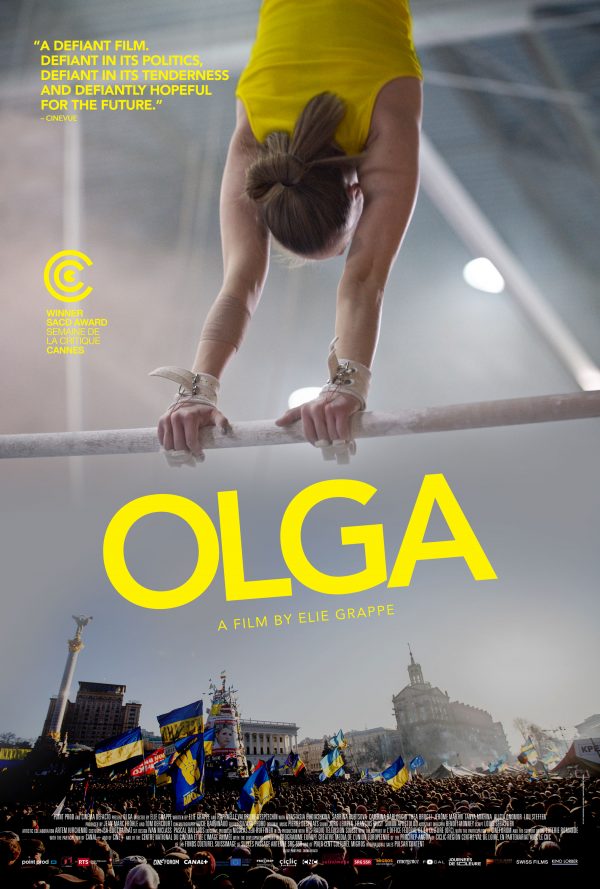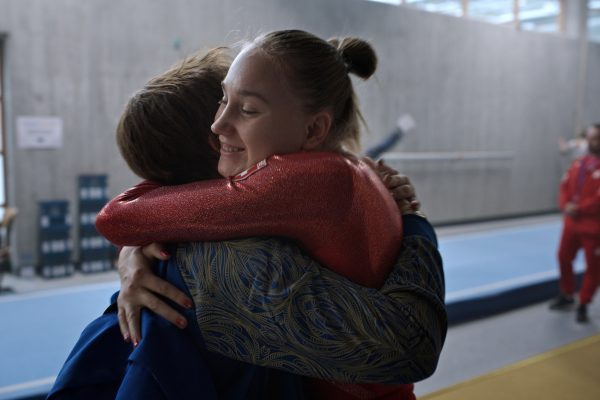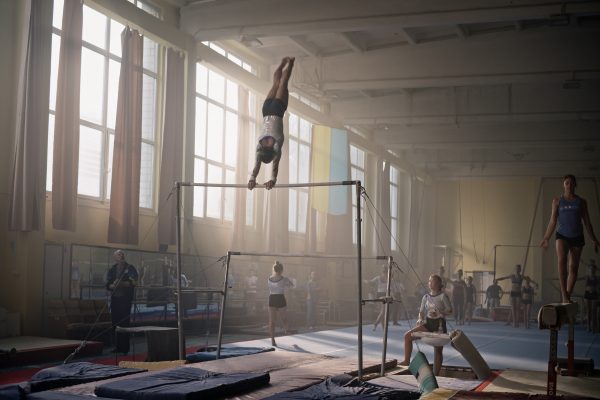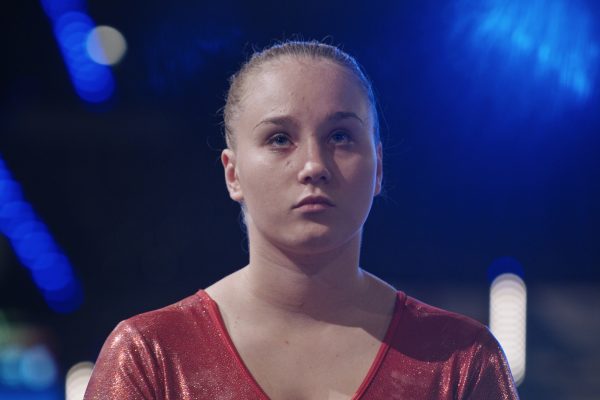‘Olga’ spotlights the essential power of choice

“Olga” (2021 production, 2022 release). Cast: Anastasia Budiashkina, Tanya Mikhina, Sabrina Rubtsova, Caterina Barloggio, Théa Brogli, Alicia Onomor, Lou Steffen, Jérôme Martin, Alexander Mavrits, Roger Jendly. Director: Elie Grappe. Screenplay: Raphaëlle Desplechin and Elie Grappe. Web site. Trailer.
For starters, it’s 2013, and Ukraine is in a period of internal turmoil. Even though the now-independent country is no longer under the thumb of Soviet rule, its leadership is nevertheless beholden to the nation’s strong-arm Russian neighbors, who are seeking to exercise undue influence in Ukraine’s affairs, especially in its economy, which has become rife with corruption. It’s a tense time in light of a growing opposition movement, which has become a frequent target of those who have something to lose. The criminal element routinely seeks to manipulate and inflict brutal retaliation against anyone who poses a challenge. That includes Olga’s mother, Ilona (Tanya Mikhina), an investigative reporter seeking to expose the racketeers, circumstances that threaten not only her, but also her daughter.
What’s more, relocating to Switzerland would represent a huge change for Olga. It would mean having to leave behind both her mother and her friends, like fellow gymnast Sasha Robtsova (Sabrina Robtsova), a spitfire competitor and an outspoken supporter of the opposition, at a time of rising upheaval at home. Such a change would also require her to learn a new language and culture and to attempt to forge new relationships with new colleagues (many of them gymnastic teammates suspicious of the outsider’s arrival), as well as relatives she’s never met before. That’s a lot to take in on top of the rigorous training she’d undergo in preparation for the upcoming 2014 European gymnastics championship in Stuttgart, Germany. But, if Olga wants to become a stand-out at that competition and be taken seriously as a viable candidate for the 2016 Olympic team, she’ll need to make the sacrifice to help prepare her for that destiny.

Once in Switzerland, Olga begins working on her adjustment. It isn’t always easy, though: She must get used to speaking French instead of Russian; she has to adapt to the training regimen of a new coach (Jérôme Martin); she struggles to become acquainted with teammates (Caterina Barloggio, Théa Brogli, Alicia Onomor, Lou Steffen) who don’t always have her best interests at heart; and she’s perplexed by some of the ways of unknown relatives, such as her inexplicably ornery grandfather (Roger Jendly). But that’s just the start of it.
Olga’s biggest test comes when the Maidan Uprising begins in Kyiv’s Independence Square in November 2013. The protests, which begin when the Ukrainian government chooses to abandon its plan to sign the European Union-Ukraine Association Agreement in favor of even closer ties with Russia, quickly leads to an ongoing string of violent street protests. And, before long, the Uprising soon expands its scope, calling for the resignation of President Viktor Yanukovych and an end to human rights violations. The tension has everyone on edge – and not just in Ukraine.
Despite being located hundreds of miles away, Olga is far from unaffected by the conflict. She worries about the well-being of her mother, who aggressively continues with her reporting, now from on the ground in Independence Square itself. She’s also fearful about Sasha’s safety, who has taken to the streets to join in the protests. She’s livid when she learns that her former coach (Alexander Mavrits) has abandoned the Ukrainian team in favor of a more lucrative position training Russian gymnasts. And, to complicate all of this, these developments emerge just as she’s approaching the European gymnastics championship.
This all prompts a major decision for Olga: Should she follow through on her plan to compete in the tournament she’s been so diligently training for, or should she return to Ukraine to join the fight and be with her people, most notably those she’s closest to? That’s a lot of pressure for anyone, but that’s especially true for an adolescent with big expectations placed on her shoulders (and much of it of her own making). It remains to be seen how matters will unfold, particularly when additional developments arise making the decision even more difficult. Suddenly even the most challenging piece of gymnastics apparatus doesn’t seem nearly as daunting.

Regardless of which path she chooses, Olga should remain cognizant of the fact that she inherently possesses the power of choice, a power that’s always at her disposal, even if there are complications involved that make coming to a decision difficult. And the one clue that can help her sort out what to do rests with examining her beliefs, the foundation underlying how her existence unfolds. This is the outcome of the conscious creation process, the philosophy that maintains we employ the power of these intangible resources in shaping the nature of our reality, for better or worse. Like all of us, Olga can draw upon this school of thought in helping her to decide which path to follow, even if this practice comes with innate challenges that make identifying which option to pursue more than a little dicey.
In assessing those beliefs, it’s imperative to be honest with ourselves to identify exactly what they are. This, in turn, calls for drawing on our sense of personal integrity, as well as our ability to clear away any belief clutter or camouflage that might obscure our vision and keep us from seeing the truth. This can be challenging if we’re having to wrestle with conflicting or contradictory beliefs, as well as notions driven by fear, doubt or limitation, all of which can dilute our views and prevent us from isolating the essential beliefs we need to identify. What’s more, we may find that our beliefs might not seem to make rational sense, causing us to question the accuracy of our assessment of them.
So what are we to do in situations like this? If we’re able to successfully whittle away the flotsam and reveal the beliefs associated with our true selves, we should have faith in what we come upon, not to mention the process that helped us get there. Instilling this kind of conviction in ourselves goes a long way in making and embracing the choice we need to implement. Doing so will enable us to see the validity behind these beliefs and the decision that accompanies them, and it significantly increases the likelihood of attaining an outcome that suits us best, both for ourselves and anyone else who might be affected by our actions.

This might sound like an exercise in mental and metaphysical gymnastics (no pun intended), but, given Olga’s ability to focus, concentrate and channel her energies into grand undertakings in the gym, she’s eminently capable of doing the same when it comes to making the right choice, even if she doesn’t possess a wealth of experience in matters like this. Putting the foregoing process into place can thus bring her (and us, for that matter) a step closer to the destiny she (and we) are meant to live out. For someone like Olga, who has so many factors to consider and ultimately so much at stake both personally and vocationally, this consideration is especially crucial. With what’s on the line, she must proceed diligently, concertedly and forthrightly under circumstances like these to optimize the results she seeks to achieve. To do less could yield outcomes filled with frustration, disappointment, ridicule and even devastation, so getting her priorities straight is essential. In cases like this, let’s hope that Olga – and we – are up to the task.
What’s one to do when caught between the fulfillment of personal achievement or taking a stand for a larger cause? Such is the conundrum for the talented 15-year-old protagonist in writer-director Elie Grappe’s debut feature, a gripping tale that walks a perilous, tension-filled tightrope in telling a taut, compelling story that successfully fuses the political thriller and sports drama genres. The superb lead performance by former Ukrainian gymnast Anastasia Budiashkina is a real stand-out, successfully capturing the pressure, indecision and overwhelming emotion of someone who must rise to the occasion of everything she faces without collapsing under the weight of it all. Admittedly, there are a few under-explained gaps in the narrative that detract from the flow of the story, and some of the atmospheric cinematography definitely could have been improved upon with simple lighting adjustments. However, when it comes to the elements that matter most, it’s easy to see how this offering captured the SACD Prize at the 2021 Cannes Critics’ Week along with nominations for the film festival’s Golden Camera Award and Critics’ Week Grand Prize. “Olga” may not have attracted a lot of attention in its initial theatrical release, but it definitely deserves to do so now that it’s available for streaming online.
The power of choice is an innate birthright that we all possess, even if we don’t always recognize it as such. When faced with a difficult decision, it may seem like too much to handle, one that frequently prompts us to pivot into surrendering, proclaiming “I didn’t have a choice in the matter.” And, given the adversity in these situations, prevailing conditions may indeed make us feel that way. But, before we abandon hope, we should pause, breathe and take stock of the circumstances, after which we should strive to remember our fundamental capability to choose, no matter how arduous doing so may be, for it just might provide us with the insight we need. If we lose sight of that, there may be no turning back. But, if we hold onto it, even in the darkest of times, we just might come out of these scenarios with an answer that addresses all of our questions and provides us with the resolution we require.
Copyright © 2022, by Brent Marchant. All rights reserved.



